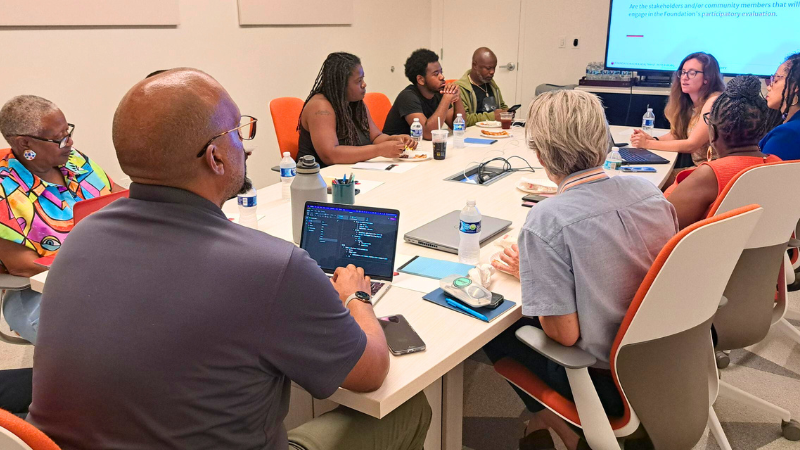Research, Evaluation & Learning Blog: Community Pulse Team

By Dr. Stephanie Rosado
From Participatory Evaluation to Participatory Research: FHSP’s Community Pulse Team (CPT)
Participatory research and evaluation refers to a community-driven approach that intentionally involves the people most affected by an issue being studied. After launching 2023-2024 grant funding to improve mental health and wellness (MHW) and economic equity and justice (EEJ) in south St. Petersburg , the Foundation launched its Community Pulse Team (CPT) participatory evaluation initiative. The idea was that CPT could serve to evaluate the impact of the Foundation’s funding; its focus, however, has since evolved.
Evolution of CPT
After recruiting a group of local residents from zip codes 33705, 33711 and 33712, Foundation Research, Evaluation, and Learning (REaL) staff then trained CPT members on concepts like evaluative thinking, evaluation practices, and research methods. CPT members led the creation of a logic model related to MHW and EEJ to help make their collective thinking and community insights visible regarding the indicators we should be looking for as we approach studying our community’s current landscapes of MHW and EEJ. From this, CPT members formulated research questions, selected appropriate methods for data collection, and developed a qualitative interview guide for conversations with other residents.
It was through this iterative process of dialogue, collaboration, and learning from CPT members’ perspectives that we collectively decided to shift CPT from a participatory evaluation effort to a participatory research effort. We realized a true participatory evaluation effort would miss the opportunity to gain a deeper level of understanding about our local community context; going deeper with participatory research, in turn, would give funded partners more meaningful feedback about community successes and opportunities so that they can better tailor their efforts.
The shift from an evaluation mindset to a research approach also made sense given CPT’s training timeline. CPT members took part in a year’s worth of monthly two-hour training sessions that began roughly at the same time that many of the funded projects launched. As a result, CPT members were not able to collect the baseline data necessary for a true evaluation. Also, Foundation funded partners already evaluate the efficacy and outputs of their own programming; they’re in a better position to discuss the direct impact of funding dollars. Thus, what began as an approach to evaluating the impact of funding dollars evolved into a research inquiry about the attitudes, resources, and barriers present in the community.
CPT’s research questions currently are:
- What attitudes exist about resources related to MHW? (i.e., knowledge/awareness of availability, personal utilization, etc.)
- What do individuals perceive as barriers to achieving optimal MHW
- What attitudes exist about resources related to EEJ?
- What do individuals (residents, local business, etc.) perceive as barriers to achieving EEJ?
We hope that through the CPT’s conversations with community members, we will gain insight that we can share with funded partners and other non-profits to help inform their collective efforts, increase impact, and highlight opportunities and strengths they can build on. Progress, Learnings, and Looking Ahead
So far, CPT has conducted 28 interviews across the prioritized zip codes of 33711, 33712, and 33705. This first round of interviews focused specifically on MHW, with EEJ interviews to follow. Every month, CPT members meet for what we call “sense-making sessions.” These sessions are where we make sense of the qualitative data from the interviews and engage in group thematic analysis.
In the coming months, the Foundation’s CPT will be working toward finalizing data collection and creating a dissemination plan. This plan will involve conversations with funded partners about findings that may help inform their work and dissemination to the broader community.
Overall, this collaborative process has been rewarding to CPT members and Foundation staff alike. CPT members have expressed their appreciation for being able to learn about, contribute to, and lead evaluation and research efforts. Some members expressed that this process has helped them reconnect with or connect more deeply with their local community. For the Foundation, the process has led to cross-departmental organizational learning about participatory research and evaluation: understanding the time commitment, rigor, and necessary measures needed to build trust and effectively engage in participatory efforts with humility and transparency. This initiative has also expanded our understanding of our local community context, as we’ve learned about resources, gained new perspectives, and developed a deeper understanding of the lived experiences within our communities. While many organizations launch participatory initiatives because they are committed to equity and recognize the richness and value of the findings and outcomes, we want to emphasize that the process has been just as, if not more, valuable than the outcomes.
For more information on our Community Pulse Team, see page 25 of our annual report.
